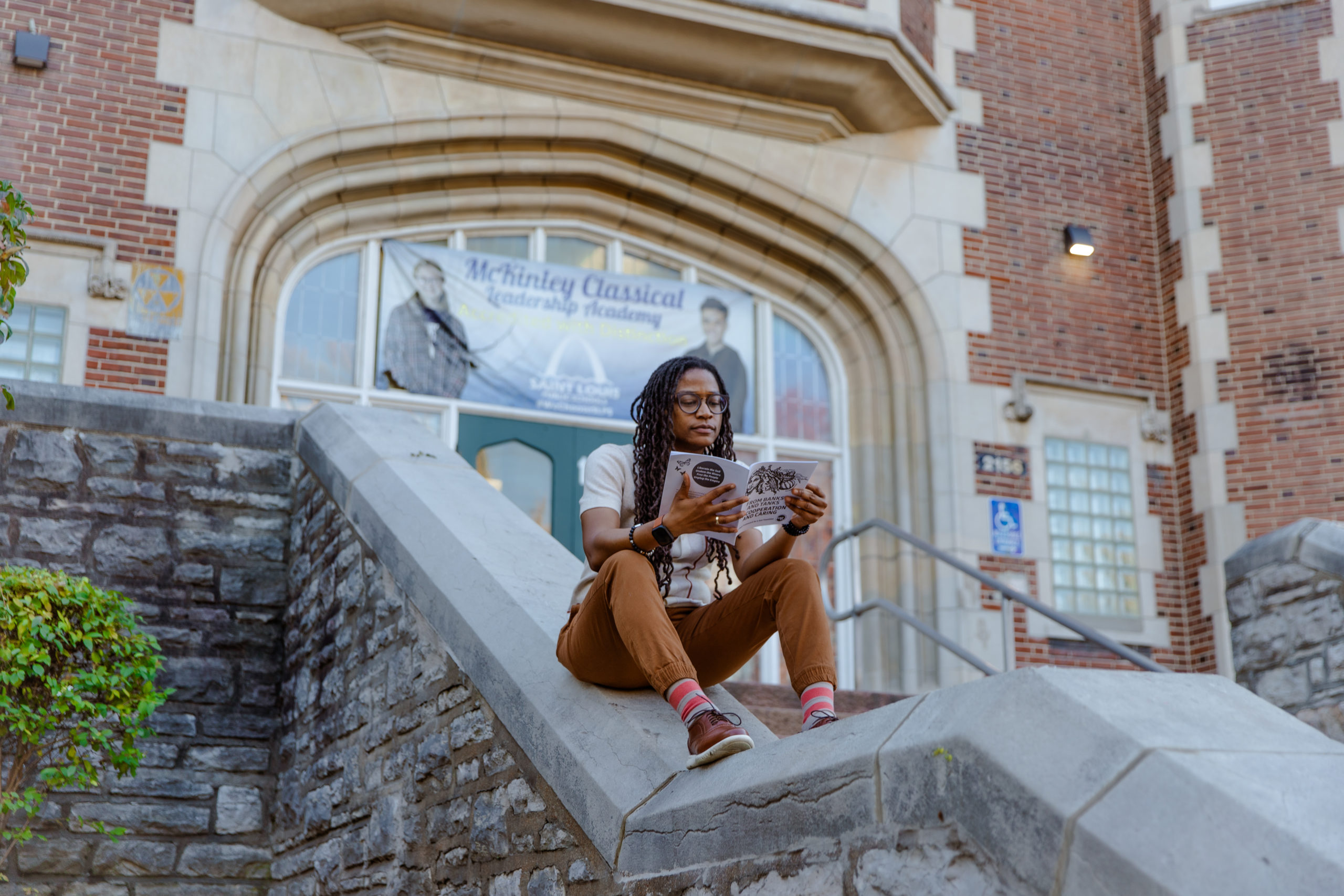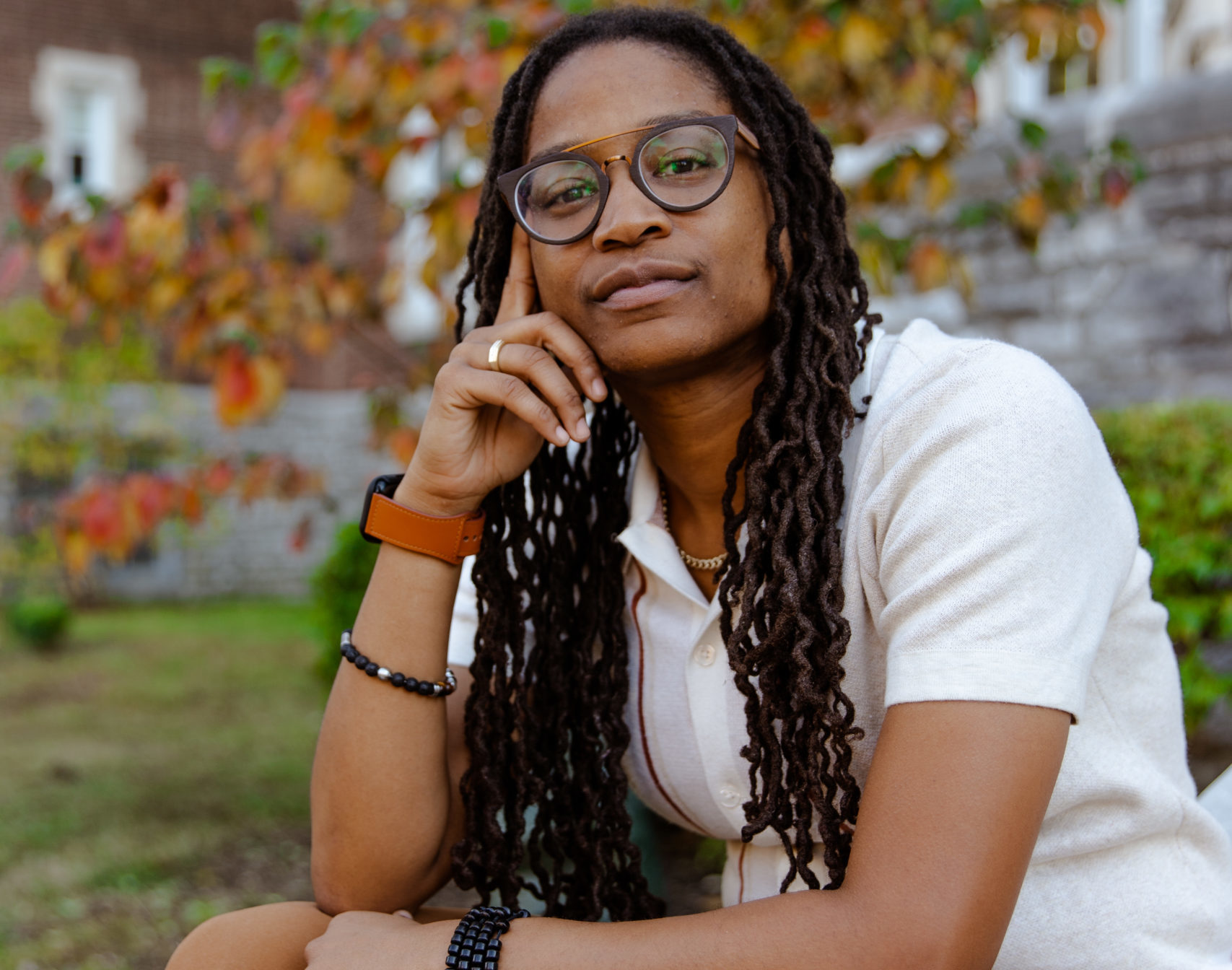What it Takes to Thrive: The Importance of Investing in Everyone
November 29, 2022
What it Takes to Thrive: The Importance of Investing in Everyone
By: Amina Abdul-Malik

WEPOWER’s Director of Investments and a native North St. Louisan, Amina Abdul-Malik, reads on the steps of her former middle school, a place where she saw “the possibilities of educational equity come to life” in her childhood. Photo by Nyara Williams.
“The conditions I saw growing up in North City just didn’t seem to reflect the beauty and intelligence I saw in the people around me.” -Amina Abdul-Malik
I call it ‘Entrepreneur Brain.” It’s where your brain is operating at 100 miles per hour in ten different directions with tasks and ideas. I have a case of it myself. Too often, valuable ideas and solutions that entrepreneurs have get lost in all of the red tape, systems, and attempting to understand how to order your steps. These processes, skills, and jargon can form a sort of black box of information that hasn’t been accessible to so many people, and even more so with particular demographics. At WEPOWER, part of our team’s work is to change that.
The person to do this work can’t just be a banker. Yes, it has to be someone who understands finance and can read an income statement, but much more importantly, it has to be someone that understands the personal context of who these entrepreneurs are and the challenges they face as human beings with distinct cultural experiences. I’ve been there–I’ve seen and felt the impact of inequitable systems throughout my personal and professional life. Now, I’m transforming that for myself and others in our community.
In my childhood growing up in North City, I got to see a lot of the ups and downs of entrepreneurship first hand. My dad was a plumber and ran his own plumbing business, and I always enjoyed getting to be a part of his work. I watched as he was able to wake up every day and make decisions for himself to support our family, but sometimes he had to sacrifice his own sanity and stability for that freedom. Even though he had the necessary skills, he wasn’t able to make decisions to grow his business the way he wanted to because he didn’t have the right certifications or technical qualifications. Sometimes things got tight for us. He always made a way, but I’m angered by the lack of support he had.
At the same time I was also witnessing my mother’s path in corporate America. She worked for one company for 20 years. My mom heavily valued education, so she made sure that us kids were always being enriched in lots of ways–and we were! She sought the same enrichment for herself, too, and was always trying to learn and get better, but corporate America wasn’t about that. They treated her differently than many of her white peers, and she went undervalued and overlooked. Throughout my mom’s time at that job, she experienced a sharp decline in her mental health and eventually left. I’d notice similar patterns in my own career journey down the line.

Amina: The conditions I saw growing up in North City just didn’t seem to reflect the beauty and intelligence I saw in the people around me. Photo by Nyara Williams.
Looking out into the neighborhood, so many of my peers in our North City community had incredible talents and skills, but they just weren’t afforded the same things as I was. In fact, the conditions I saw growing up in North City just didn’t seem to reflect the beauty and intelligence I saw in the people around me in general. I didn’t know why all these things were, and I didn’t have a drawn-out plan as to what to do about it, but I wanted it to change.
A major turning point came for me when I was in college. I was getting my undergraduate degree in business administration and simultaneously working full-time in retail tech sales and marketing. I was in a great space. At my job, I got so much joy from helping others and lifting others up at first that it took me a while to realize that people weren’t doing the same for me.
“So often, amazing potential gets disregarded. I saw it with my peers growing up in North City, I saw it happen to my mom, and now it had just happened to me.”
I was an amazing employee. I was training coworkers, exceeding sales goals, doing all the things that were deemed to be “right” by our company, but I wasn’t being recognized for any of it. In fact, they had me training new hires for roles that I wanted and would keep getting passed up for. I started feeling frustrated, then deflated and depressed. I was working long hours. My grades started suffering. It was like an echo of what my mom had experienced not too long ago.
Just as my mom left her corporate job because of the mental health decline she went through, I too, left feeling defeated and hopeless. Yet it was in this low state that something became very clear to me. So often, amazing potential gets disregarded. I saw it with my peers growing up in North City, I saw it happen to my mom, and now it had just happened to me. It’s harmful, unfair, and definitely a missed opportunity for our greater community. From then on, no matter who I became or where I ended up, I would be an instrument for leveraging the power and potential of myself and others.

Photo by Nyara Williams.
Not long after I made that switch from contributing to a narrow system that doesn’t support people who look like me toward the world that I wanted, doors started opening. I got an opportunity to directly help entrepreneurs in St. Louis gain the skills and expertise they needed to grow. It felt fate-aligned. I rooted myself into this work for four wonderful years, and felt so absorbed in the impact we were making.
Leading into my fourth year, I started wanting to stretch my capabilities even further. I had built a strong foundation in my knowledge base and capacities, and was great at helping others see their abilities, but now I really wanted to help folks activate it. And not only that, I also wanted to activate the system. I started seeing that not only can we help entrepreneurs fit and succeed in the current system, but we can shape the system itself to become more open, agile, resilient, and strong. I always said that if I were ever to go into politics, one of my taglines would be, “We strive to THRIVE, not survive.” For me, it was time to focus on transforming systems to create conditions for all of us to thrive.
This growing desire had fate reach out to me again, and I was contacted by WEPOWER to pursue a role as their Director of Investments. It is this role where I am committed now, and the work is incredibly dynamic. At the programmatic level, I am the point person for WEPOWER Capital, which uses revenue-based investing to provide up to $200,000 in capital, coaching, and connections to growing Black and Latinx businesses. I also steward Kiva St. Louis, which provides community-funded, interest-free loans to smaller businesses of up to $15,000.
Another major part of my work is providing personalized advising and coaching for Black and Latinx entrepreneurs. I help them access the skills and tools they need to achieve the next steps on their path and become investment ready. We unpack the contents of that mysterious “black box” of business know-how, and I accompany them in overcoming their highly personal and nuanced challenges.
On a more macro level, our team is identifying the siloed systems relevant to building robust community wealth, and is working to break them down so we can all be more effective together. We meet with other entrepreneur support organizations (ESOs), investors, and other entities to determine better practices for how we can support entrepreneurs and our communities together. To do this, having an accurate understanding of what moves and is important to everyone at the table is key–it helps us build trust, collaborate effectively, and make progress that serves the entire community.
“...an investment in a Black or Latinx business is an investment in the health of our greater society.”
I want everyone to recognize that an investment in a Black or Latinx business is an investment in the health of our greater society. It fertilizes belief in what’s possible when we shed the damaging discriminatory beliefs, practices, and policies that separate and silo us. Every investment we make in an entrepreneur of a systematically disenfranchised demographic is evidence that we are collectively evolving our mental models and seeing the value of investing in the potential of everyone. Where your investments go demonstrates and reinforces the morals and values of who you are. Of who we are as a society. And our capacity to create change grows as we do.
Everyone has value that can be drawn on to better themselves and others around them. I hold this same belief for the businesses and founders that I work with, for the partnerships we make here at WEPOWER, and especially for St. Louis city and the communities in it that we serve. I am dedicated to being an instrument to building and leveraging our capabilities at the micro and macro scale because it is all relevant, and I am looking to engage with others towards that end.

Amina: I always said that if I were ever to go into politics, one of my taglines would be, “We strive to THRIVE, not survive.” Photo by Nyara Williams.
I am looking to engage with entrepreneurs who are committed to seeing and walking their path, even if it’s blurry or unclear. I’m looking to engage with investors who are considering or already certain of the value in creating a more sustainable St. Louis society. And I’m looking to engage with organizations and individuals who share this vision and are committed to leveraging our strengths to build community wealth.
Your talents, skills, experiences, and knowledge are your instruments. Study them, play them, and discover your favorite ways to hear your talents in this world. Challenge your doubts as well as your own perception of what’s possible, and allow yourself grace to grow. Everyone has a role to play in building community wealth, and we are here to support and collaborate in numerous ways.
Written in partnership with Whitney Bembenek.
